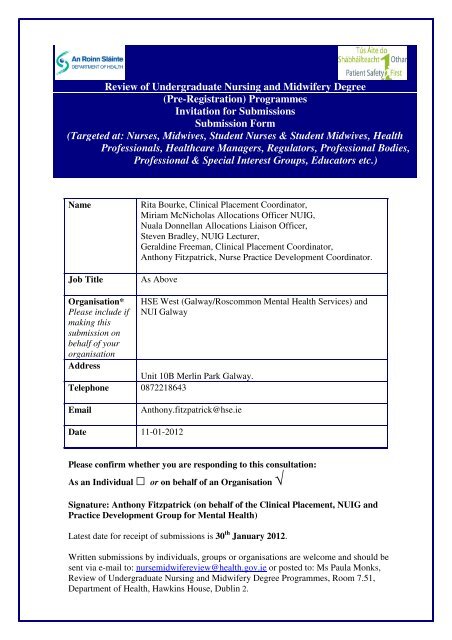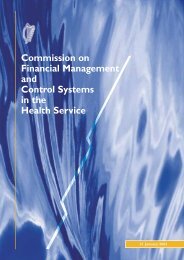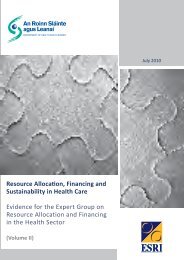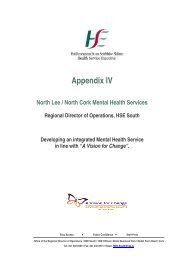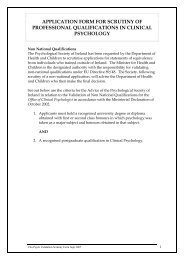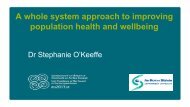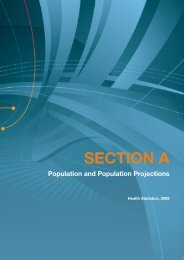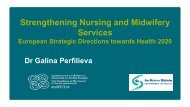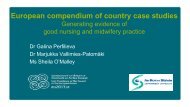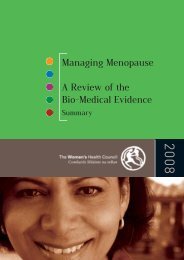Download this file - Department of Health and Children
Download this file - Department of Health and Children
Download this file - Department of Health and Children
Create successful ePaper yourself
Turn your PDF publications into a flip-book with our unique Google optimized e-Paper software.
Review <strong>of</strong> Undergraduate Nursing <strong>and</strong> Midwifery Degree(Pre-Registration) ProgrammesInvitation for SubmissionsSubmission Form(Targeted at: Nurses, Midwives, Student Nurses & Student Midwives, <strong>Health</strong>Pr<strong>of</strong>essionals, <strong>Health</strong>care Managers, Regulators, Pr<strong>of</strong>essional Bodies,Pr<strong>of</strong>essional & Special Interest Groups, Educators etc.)NameJob TitleRita Bourke, Clinical Placement Coordinator,Miriam McNicholas Allocations Officer NUIG,Nuala Donnellan Allocations Liaison Officer,Steven Bradley, NUIG Lecturer,Geraldine Freeman, Clinical Placement Coordinator,Anthony Fitzpatrick, Nurse Practice Development Coordinator.As AboveOrganisation*Please include ifmaking <strong>this</strong>submission onbehalf <strong>of</strong> yourorganisationHSE West (Galway/Roscommon Mental <strong>Health</strong> Services) <strong>and</strong>NUI GalwayAddressUnit 10B Merlin Park Galway.Telephone 0872218643EmailAnthony.fitzpatrick@hse.ieDate 11-01-2012Please confirm whether you are responding to <strong>this</strong> consultation:As an Individual □ or on behalf <strong>of</strong> an Organisation √Signature: Anthony Fitzpatrick (on behalf <strong>of</strong> the Clinical Placement, NUIG <strong>and</strong>Practice Development Group for Mental <strong>Health</strong>)Latest date for receipt <strong>of</strong> submissions is 30 th January 2012.Written submissions by individuals, groups or organisations are welcome <strong>and</strong> should besent via e-mail to: nursemidwifereview@health.gov.ie or posted to: Ms Paula Monks,Review <strong>of</strong> Undergraduate Nursing <strong>and</strong> Midwifery Degree Programmes, Room 7.51,<strong>Department</strong> <strong>of</strong> <strong>Health</strong>, Hawkins House, Dublin 2.
Freedom <strong>of</strong> InformationPlease note that it is intended that all submissions received will be made availableunder the Freedom <strong>of</strong> Information Acts <strong>and</strong> as such may be published on the<strong>Department</strong> <strong>of</strong> <strong>Health</strong> website following the publication <strong>of</strong> the Final Report <strong>of</strong> theReview <strong>of</strong> Undergraduate Nursing <strong>and</strong> Midwifery Degree Programmes.
ContextThe <strong>Department</strong> <strong>of</strong> <strong>Health</strong> has commenced a review <strong>of</strong> the undergraduate nursing <strong>and</strong>midwifery degree programmes in order to establish their efficiency <strong>and</strong> effectiveness inpreparing nurses <strong>and</strong> midwives to practice in the Irish healthcare system now <strong>and</strong> intothe future. The undergraduate nursing <strong>and</strong> midwifery degree programmes have been inplace since 2002 for nursing (general, psychiatric <strong>and</strong> intellectual disability nursing)<strong>and</strong> 2006 for midwifery <strong>and</strong> integrated children <strong>and</strong> general programmes. These are theeducation programmes that prepare student nurses <strong>and</strong> student midwives to registerwith An Bord Altranais in order to practice as staff nurses <strong>and</strong> staff midwives in thehealth services.The Irish healthcare system is undergoing significant reform with a focus on patientsafety <strong>and</strong> quality patient care. More care will be delivered in the community with anemphasis on improving the health <strong>of</strong> the population <strong>and</strong> reducing health inequalities byaddressing the causes <strong>of</strong> preventable illnesses. This Review aims to build on theexcellence <strong>of</strong> the current pre-registration nursing <strong>and</strong> midwifery education programmesin order to prepare nurses <strong>and</strong> midwives to deliver healthcare services now <strong>and</strong> into thefuture.A Review Group has been established to oversee the review <strong>of</strong> the nursing <strong>and</strong>midwifery programmes having regard to the objectives <strong>of</strong> the current health reformprogramme, the future workforce needs <strong>of</strong> the public health system <strong>and</strong> the need toachieve value for money. This Review will be conducted on a modular basis consisting<strong>of</strong> the following elements:1) An examination <strong>of</strong>:- the content <strong>of</strong> the undergraduate programmes- the structure <strong>of</strong> the current degree programmes including the separate points <strong>of</strong>entry 1 , clinical placement requirements <strong>and</strong> governance arrangements.2) An analysis <strong>of</strong> the number <strong>of</strong> student places required to ensure sufficient numbers <strong>of</strong>nurse <strong>and</strong> midwife graduates for new patterns <strong>of</strong> service delivery within the publichealth system.The Review Group will consider the findings <strong>of</strong> both exercises <strong>and</strong> report to theMinister for <strong>Health</strong> by September 2012. Following the completion <strong>of</strong> these exercisesthe <strong>Department</strong> <strong>of</strong> Education <strong>and</strong> Skills <strong>and</strong> the Higher Education Authority (HEA) inconsultation with the higher education institutions will lead on the development <strong>of</strong> anychanges required in relation to the organisation <strong>and</strong> delivery <strong>of</strong> nursing <strong>and</strong> midwiferydegree programmes within the higher education system. This will take into account thebroader education policy considerations in relation to dem<strong>and</strong> for such programmesnationally <strong>and</strong> internationally <strong>and</strong> the overall funding implications involved <strong>and</strong> takefull consideration <strong>of</strong> the findings <strong>of</strong> the report to the Minister for <strong>Health</strong> on workforceplanning <strong>and</strong> curricula changes.A briefing paper is available on the <strong>Department</strong>’s website www.dohc.ie/issues/nmr orcan be requested by telephone 01 6354111 or by emailnursemidwifereview@health.gov.ie1 There are direct entry education programmes at degree level in general nursing, psychiatric nursing,intellectual disability nursing, combined children’s <strong>and</strong> general nursing; <strong>and</strong> midwifery. Further detail isprovided in attached Explanatory Note
Question 1. What do you consider motivates people to choose a career in nursingor midwifery?(There are direct entry education programmes at degree level in general nursing,psychiatric nursing, intellectual disability nursing, combined children’s <strong>and</strong> generalnursing; <strong>and</strong> midwifery leading to registration in the appropriate division <strong>of</strong> thenursing or midwifery register. Further detail is provided in attached Explanatory Note)If answering <strong>this</strong> question in relation to a particular nursing (general, psychiatric,intellectual disability, children’s) or midwifery perspective please specify.(Psychiatric)4 year degree programme with both pr<strong>of</strong>essional <strong>and</strong> academic qualifications at the end<strong>of</strong> the programme.People want to work in the area <strong>of</strong> mental health <strong>and</strong> people with mental health issues.People may have had personal or family experience <strong>of</strong> mental health issues <strong>and</strong>/ornursing.International recognition <strong>of</strong> a qualification in mental health nursing.Good career prospects <strong>and</strong> opportunities for continued pr<strong>of</strong>essional development.People want to care for persons with mental health issues i.e. they have for want <strong>of</strong> abetter word a vocation.People find working with people with mental health problems very rewarding <strong>and</strong> getpersonal fulfilment from <strong>this</strong> work.A desire to work closely with people who are vulnerable <strong>and</strong> need the support <strong>of</strong> apr<strong>of</strong>essional psychiatric nurse with the required specialist skills <strong>and</strong> education.To acquire the distinct set <strong>of</strong> skills which a psychiatric nurse needs to care <strong>and</strong> supportpeople with mental health problems.Question 2. What do you consider are the strengths <strong>of</strong> the nursing <strong>and</strong> midwiferyundergraduate pre-registration degree programmes?Nursing Programmes:(Please give consideration to each <strong>of</strong> the nursing programmes <strong>and</strong> where relevantidentify which one you are referring to i.e general nursing, psychiatric nursing,intellectual disability nursing, combined children’s <strong>and</strong> general nursing. Further detailis provided in attached Explanatory Note)
(Psychiatry)This is a Level 8 academic award.Students develop research skills <strong>and</strong> learns how to apply evidence <strong>and</strong> research inpractice.Student nurses acquire a greater knowledge base.Students are given extensive clinical experience through early exposure to practice.Very good balance between theory <strong>and</strong> practice.Students are supernumery which facilitates student learning <strong>and</strong> places a greateremphasis on learning in the clinical area..Protected learning.Protected time for Reflection which introduces students to the importance <strong>of</strong> reflectionin <strong>and</strong> on practice throughout their nursing career.Presecptorship model placing emphasis on the individual student <strong>and</strong> what it is to be apsychiatric nurse.Provides a sound foundation for postgraduate courses.Programme incorporates Clinical Internship which facilitates transition from student toa qualified competent psychiatric nurse.Structure <strong>of</strong> the programme allows for the development <strong>of</strong> theory <strong>and</strong> practice leadingto a competence <strong>and</strong> confidence practitioner.Rotation across clinical placements <strong>and</strong> mental health services facilitates a widerexperience <strong>of</strong> clinical practice.Exposure to the community, families, advocates <strong>and</strong> carers <strong>of</strong> people with mentalhealth issues adds to the width <strong>of</strong> experience for the student psychiatric nurse.Prepares nurses to work in a wide variety <strong>of</strong> clinical <strong>and</strong> community settings.Extensive clinical exposure gives the students an introduction to communication <strong>and</strong>assessment skills required to make sound judgements relating to the care <strong>of</strong> people whoare vulnerable <strong>and</strong> have varying mental health needs.Question 3. What do you consider are the weaknesses <strong>of</strong> the nursing <strong>and</strong>midwifery undergraduate pre-registration degree programmes?Nursing Programmes:
(Please give consideration to each <strong>of</strong> the nursing programmes <strong>and</strong> where relevantidentify which one you are referring to i.e general nursing, psychiatric nursing,intellectual disability nursing, combined children’s <strong>and</strong> general nursing. Further detailis provided in attached Explanatory Note)(Psychiatric)C<strong>and</strong>idate selection is based purely on a points system or aptitude test.There is a lack <strong>of</strong> flexibility in clinical placements as all students have to undertakespecialist placements outside <strong>of</strong> internship period.Students undertaking specialist placements earlier in the programme have lessexperience <strong>and</strong> may not benefit to the same extent than senior students who haveacquired a greater skill set.Midwifery Programme:Question 4. What roles would you like to see nurses <strong>and</strong> midwives doing in thefuture to meet the needs <strong>of</strong> consumers <strong>of</strong> health services bearing in mind thechanging nature <strong>of</strong> healthcare delivery in Irel<strong>and</strong>?Nursing Programmes:(Please give consideration to each <strong>of</strong> the nursing programmes <strong>and</strong> where relevantidentify which one you are referring to i.e general nursing, psychiatric nursing,intellectual disability nursing, combined children’s <strong>and</strong> general nursing. Further detailis provided in attached Explanatory Note)(Psychiatry)Development <strong>and</strong> extension <strong>of</strong> Psychiatric Nurses roles in line with National Mental<strong>Health</strong> Programme Plan 2011- Vision For Change (2006) the Quality Framework forMental <strong>Health</strong> Services in Irel<strong>and</strong> (2005), Strategy for Psychiatric/Mental <strong>Health</strong>Nursing in Irel<strong>and</strong> (2011) Draft report to contribute to the development <strong>of</strong> an effectiveservice delivery.In view <strong>of</strong> the impact <strong>of</strong> the current economic adversity on society <strong>and</strong> the increasingrate <strong>of</strong> national suicide, psychiatric nurses need to develop <strong>and</strong> apply earlydetection/intervention strategies using evidence based knowledge <strong>and</strong> skills.Assist/Storm training should inform nursing interventions.Psychiatric nurses need to continue to develop their role working with carers,advocates, families voluntary agencies caring for clients with mental health needs.
Develop roles relating to crisis intervention to help in the prevention <strong>of</strong>admission/readmission to inpatient mental health units.Develop their health education/health promotion role underpinned by evidence basedknowledge <strong>and</strong> skills within the nurse/patient interaction <strong>and</strong> also within the widercommunity. Have a greater role in mental health promotion.Develop a range <strong>of</strong> psychosocial / counselling roles / preventative psychoeducationinterventions within primary care teams .Develop nurse-led services community to support recently discharged clients <strong>and</strong>prevent admissions to inpatient mental health units.Develop roles in relation to suicide prevention. Especially supporting families, clients<strong>and</strong> communities following an attempted or actual suicide.Develop recovery competencies <strong>and</strong> collaborative working with service users in orderto facilitate them to achieve clinical <strong>and</strong> personal recovery.Develop transformational leadership to deconstruct the medical model approach <strong>and</strong>create responsive services underpinned by the ethos <strong>of</strong> recovery.Develop effective advocacy skills in order to advocate for vulnerable individuals <strong>and</strong>also to ensure that service users rights to an effective pr<strong>of</strong>essional service is achievedDevelop roles for early detection/ intervention strategies in mental health illness e.g. 1 stepisode psychosis <strong>and</strong> eating disorders.Develop role within liaison psychiatry <strong>and</strong> working with youth groups e.g. JigsawDevelop roles in addiction counselling.Develop applied research, audit <strong>and</strong> quality assurance skills in order to monitor theeffectiveness <strong>of</strong> nursing interventions <strong>and</strong> develop a continuous quality improvementapproach to service delivery.Question 5. Does the content <strong>of</strong> the degree programmes need to be updated orexp<strong>and</strong>ed?YESQuestion 5a. If yes, please describe the changes you would like to see?(The content <strong>of</strong> the programme refers to the syllabus (i.e. an indication <strong>of</strong> the range <strong>of</strong>topics to be taught as listed by An Bord Altranais for each <strong>of</strong> the degree programmes.)
Nursing Programmes:(Please give consideration to the content <strong>of</strong> each <strong>of</strong> the nursing programmes <strong>and</strong> whererelevant identify which one you are referring to i.e general nursing, psychiatricnursing, intellectual disability nursing, combined children’s <strong>and</strong> general nursing)Content needs to be updated in relation:Changing mental health policy <strong>and</strong> legislation.Advanced practice in mental healthChanging delivery <strong>of</strong> mental health careKey transferrable skills i.e. skills that could be developed in an acute setting that aretransferable to old age psychiatry or primary care.Early intervention e.g. 1 st episode psychosis.Chronic illness e.g. physical conditions alongside long term mental illness.Recovery.Child <strong>and</strong> adolescent mental health e.g early interventions.Clinical audit skills <strong>and</strong> quality management skills to continuously monitor <strong>and</strong>improve service delivery.
Question 7. Any further comments?It is very important that separate entry points are maintained for students to qualify <strong>and</strong>register in the corresponding separate division <strong>of</strong> the nursing register. This is to ensurethat the student gets the full experience <strong>of</strong> clinical practice within the specialist fielde.g. Psychiatry, while also completing the specialist theory related to the that area <strong>of</strong>practice. Core modules are to be promoted but not at the expense <strong>of</strong> specialistknowledge.
-Please limit responses to 10 pages-
Review <strong>of</strong> Undergraduate Nursing <strong>and</strong> Midwifery Degree ProgrammesExplanatory Note1. Points <strong>of</strong> Entry to Nursing <strong>and</strong> MidwiferyThere are direct entry education programmes at degree level in general nursing,psychiatric nursing, intellectual disability nursing, integrated children’s <strong>and</strong> generalnursing; <strong>and</strong> midwifery.1.1 General, Psychiatric <strong>and</strong> Intellectual Disability ProgrammesNurse registration education programmes (general, psychiatric <strong>and</strong> intellectualdisability) moved from certificate exit point to a three-year diploma introduced in 1994.Since 2002 general, psychiatric <strong>and</strong> intellectual disability registration educationprogrammes are delivered as a four-year honours degree.A minimum number <strong>of</strong> hours/weeks in theoretical <strong>and</strong> clinical instruction must besuccessfully completed before applying to register with An Bord Altranais. For most <strong>of</strong>the programme the student receives a combination <strong>of</strong> theoretical <strong>and</strong> clinical instruction<strong>and</strong> <strong>this</strong> period generally includes normal third-level college holidays. During <strong>this</strong>period the student is not a paid employee <strong>of</strong> the health service. The usualentitlements/conditions regarding a means-tested third-level grant applies to studentnurses.Students are exposed to a variety <strong>of</strong> clinical placements during their educationprogramme for example in clinical placements in general hospitals, in community, inolder person settings etc. The first clinical placement occurs early in the programme,usually within three months <strong>of</strong> commencement. In the final fourth year <strong>of</strong> the educationprogramme a continual 36 week rostered clinical placement (internship) takes place.This occurs in the clinical area <strong>of</strong> the particular programme for example it will be in amental health service for psychiatric student nurses. During <strong>this</strong> period the student is apaid employee <strong>of</strong> the health service. Table 1 outlines An Bord Altranais requirements(ABA 2005a, 2011).Table 1 An Bord Altranais Requirements: Nurse Registration Programmes -General Nursing, Intellectual Disability Nursing, Psychiatric NursingAspectGeneral NursingIntellectual Disability NursingPsychiatric NursingTheoretical Instruction (to include self-directed study, exams) 58 weeksClinical Instruction (supernumerary clinical placement) 40 weeksInternship (inclusive <strong>of</strong> annual leave)36 weeksOther/Discretionary Component (at least half should 10 weekscomprise supernumerary clinical placement)Total Minimum144 weeksAn Bord Altranais outlines the list <strong>of</strong> subjects in the syllabus/indicative content for thenurse registration education programmes (General Nursing, Intellectual DisabilityNursing <strong>and</strong> Psychiatric Nursing). It is not intended to be an exhaustive list. It providesan indication <strong>of</strong> the programme content in terms <strong>of</strong> the range <strong>of</strong> topics <strong>and</strong> gives noindication <strong>of</strong> the weighting <strong>of</strong> each topic in the curriculum. Curriculum planners areexpected to demonstrate that the programme is relevant <strong>and</strong> responsive with the mostrecent policy <strong>and</strong> legislative change. Table 2 outlines the syllabus/indicative content
Students are exposed to a variety <strong>of</strong> clinical placements during their educationprogramme for example in clinical placements in antenatal clinics, labour ward,incommunity, etc. The first clinical placement occurs early in the programme, usuallywithin three months <strong>of</strong> commencement. In the final fourth year <strong>of</strong> the educationprogramme a continual 36 week rostered clinical placement (internship) takes place inareas <strong>of</strong> midwifery practice. During <strong>this</strong> period the student is a paid employee <strong>of</strong> thehealth service. Table 5 outlines An Bord Altranais requirements (ABA 2005b, 2011).Table 5 An Bord Altranais Requirements: Midwife Registration ProgrammeAspectTheoretical Instruction (to include self-directed study, exams)58 weeksClinical Instruction (supernumerary clinical placement)40 weeksInternship (inclusive <strong>of</strong> annual leave)36 weeksOther/Discretionary Component (at least half should comprise10 weekssupernumerary clinical placement)Total Minimum144 weeksAn Bord Altranais outlines the list <strong>of</strong> subjects in the syllabus/indicative contentmidwifery education programme. It is not intended as an exhaustive list. It provides anindication <strong>of</strong> the programme content in terms <strong>of</strong> the range <strong>of</strong> topics <strong>and</strong> gives noindication <strong>of</strong> the weighting <strong>of</strong> each topic in the curriculum. Curriculum planners areexpected to demonstrate that the programme is relevant <strong>and</strong> responsive with the mostrecent policy <strong>and</strong> legislative change. Table 6 outlines the syllabus/indicative contentheadings (ABA 2005b). ) The Requirements <strong>and</strong> St<strong>and</strong>ards for Midwife RegistrationEducation Programmes (ABA 2005b) provides more detailed information.Table 6 An Bord Altranais Requirements: Syllabus/ Indicative Content MidwiferyProgramme- Knowledge base for midwifery practice (Biological sciences – general & specific,psychology, pharmacology)- Non-pharmacological approaches to symptom relief- Research- Midwifery Practice – Knowledge & Skills- <strong>Health</strong> Promotion- Sociology & midwifery practice- Communication & interpersonal skills- The provision <strong>of</strong> maternal & social care services in Irel<strong>and</strong>- Pr<strong>of</strong>essional, personal, ethical & legal issues.2. Programme DeliveryThirteen higher education institutes (HEIs) deliver 44 undergraduate degreeprogrammes in partnership with 57 main healthcare agencies. This accounts for 1570places in nursing <strong>and</strong> midwifery at pre-registration level (An Bord Altranais 2011). TheNational Qualifications Authority <strong>of</strong> Irel<strong>and</strong> (NQAI) has placed the nursing <strong>and</strong>midwifery undergraduate programmes at Level 8, Honours Bachelor Degree withBachelor <strong>of</strong> Science (BSc) as the academic award. Five programmes are delivered atundergraduate degree level (Table 7).Title
Table 7 Summary <strong>of</strong> Nursing <strong>and</strong> Midwifery Undergraduate Degree ProgrammesProgrammeTitleYears Registration Number <strong>of</strong>ProgrammesNumber<strong>of</strong> PlacesNumber<strong>of</strong> HEIsNumber <strong>of</strong><strong>Health</strong>care<strong>Children</strong>’s <strong>and</strong>GeneralNursingGeneralNursingIntellectualDisabilityNursingAgencies4.5 RCN, RGN 4 100 4 44 RGN 14 860 13 224 RNID 8 180 8 10Midwifery 4 RM 6 140 6 7Psychiatric 4 RPN 12 290 12 14Nursing3. Programme Outcomes3.1 NursingAn Bord Altranais outlines five Domains <strong>of</strong> Competence which represent the level thestudent must reach on completion <strong>of</strong> the education programme for entry to the relevantNursing Register (General, Psychiatric, Intellectual Disability <strong>and</strong> <strong>Children</strong>s) held byAn Bord Altranais. The aim is to ensure that students acquire the skills <strong>of</strong> criticalanalysis, problem-solving, decision-making, reflective skills <strong>and</strong> abilities essential tothe art <strong>and</strong> science <strong>of</strong> nursing. Safe <strong>and</strong> effective practice requires a soundunderpinning <strong>of</strong> theoretical knowledge that informs practice<strong>and</strong> is in turn informed by that practice. Within complex <strong>and</strong> changing healthcareenvironments it is essential that practice is informed by the best available evidence.The competencies encompass five domains:1. Pr<strong>of</strong>essional / ethical practice2. Holistic approaches to care <strong>and</strong> the integration <strong>of</strong> knowledge3. Interpersonal relationships4. Organisational <strong>and</strong> management <strong>of</strong> care5. Personal <strong>and</strong> pr<strong>of</strong>essional development.3.2 MidwiferyAn Bord Altranais outlines five Domains <strong>of</strong> Competence which represent the level themidwifery student must reach on completion <strong>of</strong> the education programme for entry tothe Midwives Division <strong>of</strong> the Register maintained by An Bord Altranais. The aim isto ensure that students acquire the skills <strong>of</strong> critical analysis, problem-solving, decisionmaking<strong>and</strong> reflective skills <strong>and</strong> abilities essential to the art <strong>and</strong> science <strong>of</strong> midwifery.Safe <strong>and</strong> effective midwifery practice requires a sound underpinning <strong>of</strong> theoreticalknowledge that informs practice <strong>and</strong> is, in turn, informed by that practice. Withincomplex <strong>and</strong> changing healthcare environments, it is essential that practice is based onthe best available evidence.The competencies encompass five domains:1. Pr<strong>of</strong>essional/ethical midwifery practice.2. Holistic midwifery care.3. Interpersonal relationships.4. Organisation <strong>and</strong> co-ordination <strong>of</strong> midwifery care.5. Personal <strong>and</strong> pr<strong>of</strong>essional development.
ReferencesAn Bord Altranais (2005a) Requirements <strong>and</strong> St<strong>and</strong>ards for Nurse RegistrationEducation Programmes. 3 rd Edition. An Bord Altranais, Dublin.An Bord Altranais (2005b) Requirements <strong>and</strong> St<strong>and</strong>ards for Midwifery RegistrationEducation Programmes. 3 rd Edition. An Bord Altranais, Dublin.An Bord Altranais (2011) A career for you – Pre-registration honours degreeprogrammes 2011. An Bord Altranai, Dublin.


